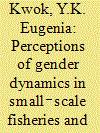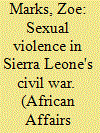| Srl | Item |
| 1 |
ID:
171909


|
|
|
|
|
| Summary/Abstract |
The Tonle Sap Lake of Cambodia is one of the most productive ecosystems in the world, supporting millions of small‐scale fisher livelihoods. Women's contributions in these fisheries are often overlooked due to socio‐cultural expectations of roles and responsibilities. This is a crucial omission since climate and anthropogenic influences increasingly threaten lake inhabitants. Addressing these challenges requires the full participation of both men and women who use the lake, thus it is necessary to first understand the social dynamics of these communities. We investigated whether there were differences between men's and women's perceptions of (i) fishing and non‐fishing practices; (ii) power, access and control over fishing resources; and (iii) perceptions towards conservation and conservation areas in Pursat, Cambodia. We interviewed fishers and key informants, and found differences in perceptions of fishing and non‐fishing practices between fishermen and fisherwomen. Men more openly acknowledged unequal power dynamics, access to and control over fishing resources when compared with women. We found contrasting ideas of community fisheries and conservation between men and women, and health and safety challenges they faced in conservation areas. Findings suggest that community perspectives and unequal power relations established specific roles for women that limited their active participation in fisheries management.
|
|
|
|
|
|
|
|
|
|
|
|
|
|
|
|
| 2 |
ID:
131812


|
|
|
|
|
| Publication |
2014.
|
| Summary/Abstract |
Rape and sexual violence loom large in the study of civil war in Africa. Sierra Leone has been one of the most prominent cases for establishing rape as a 'weapon of war', yet little is known about how sexual violence was understood by commanders or combatants within the Revolutionary United Front (RUF). Mainstream analyses of armed groups and civil war rarely engage with gender dynamics, despite their centrality to war making, power, and violence; and research that does focus on sexual violence tends to overlook the complex internal dynamics of the groups responsible. This article examines the internal gender dynamics of the RUF from the perspective of male and female members in seeking to understand the perpetration of sexual violence. It shows that both formal and informal laws and power structures existed to regulate gender relations and control sexual behaviour within the group. It identifies four categories of women - non-wives, unprotected wives, protected wives, and senior women - and shows that women's interests and experiences of sexual violence were not homogeneous, but were instead shaped by their status within the group. In this way, sexual violence, examined in social context, provides an entry point for understanding how power, protection, and access to resources are brokered in rebellion.
|
|
|
|
|
|
|
|
|
|
|
|
|
|
|
|